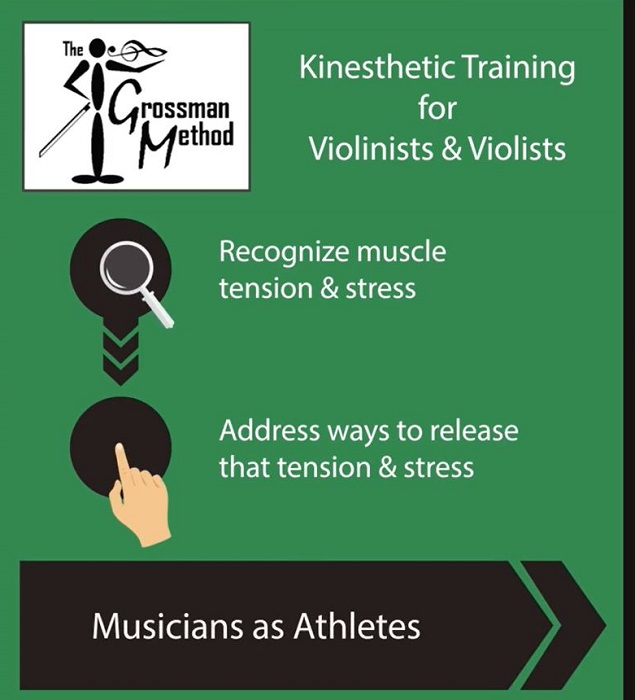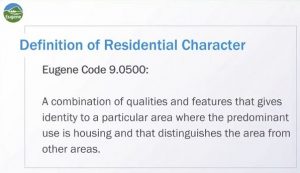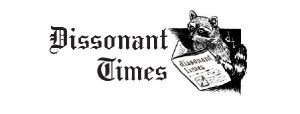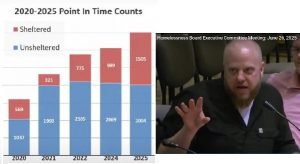Youth Radio Project: The Hal Grossman Interview
9 min read
[00:00:00] Jenah’Eve Hartman: Hi, I’m Jenah with KEPW and I’m with Hal Grossman, a professor at the University of Oregon and inventor of the Grossman Method.
[00:00:09] Hal Grossman: Well, first of all, I’m super glad to be here and to speak with you about this. The Grossman Method came out of my teaching at the Interlochen Arts Academy. When I was teaching there, I would have young players come to me—13 years old, 14 years old—that were very advanced and very gifted, but they would come to me with tension issues or injuries, playing injuries, or performance anxiety. And as a person that has been involved in the yoga community for many years, and I’m a certified yoga teacher as a matter of fact, And, my brother is a acupuncturist and so I kind of tapped him for some information as well, and slowly but surely, my students were finding the benefit of that; injuries were going away and performance anxiety things were going away. And it just kind of morphed into what is now the Grossman Method, which is a somatic way of helping musicians and dancers, and really all artists have an understanding of their bodies and learn breathing techniques and things to help them to avoid injuries, but also to help them with performance anxieties.
[00:01:26] One of the things that I do is to start to give them an introduction to the body and the muscles that we use when we play. So there’s a little bit of anatomy involved, which has been really helpful and something that’s not always on the table for, like, music teachers in their teaching.
[00:01:45] And what’s been super fun about this is, that whole process has actually streamed out into other communities. The Grossman Method has been really helpful in helping like all walks of life, people in all walks of life.
[00:01:59] Jenah’Eve Hartman: Yeah, like once in a while you do a few stretches that are very common stretches that you should be doing every day, but you don’t do.
[00:02:08] Hal Grossman: Yeah, it’s a really good point because you’re right. Honestly I think nowadays people do less of that, especially coming out of COVID. I think there’s just been less physical activity.
[00:02:21] And part of the Method, like when you come in for a lesson, is that we do a little bit of stretching or a little bit of breathing before and after the lesson so that it becomes second nature.
[00:02:34] I almost always start by saying, ‘Musicians are athletes and performing artists are athletes.’ The sports guys, they use the big muscles of the lower body, you know, the legs. Those are great big muscles. But musicians, we use the smaller muscles of the upper body. But muscles are muscles and they need to be stretched and conditioned and all those kinds of things, because all muscles can get overuse syndrome, tendonitis, carpal tunnel, all that kind of stuff.
[00:03:04] And for us in the performing arts, it can be a career-ender, if you don’t start using your body properly and have some recognition of what the muscles are that we use. I mean, that’s where we make our livelihood. And so it’s not just our talent or our skill, it also is our awareness of our whole bodies all the time.
[00:03:27] Jenah’Eve Hartman: But like to explain it a little more, how did you invent this method?
[00:03:31] Hal Grossman: After I was starting to do a lot of workshops around the country, and things were getting more formalized, I got a call from the University of North Carolina to see if I wanted to take a sabbatical and I said, Well, you know, I need a project for my sabbatical. What I want to do is take anatomy classes and biomechanics classes. And that’s really what I did. So I taught a little music over there, but I went back to college and I was enrolled in these classes. And as you probably know, the University of North Carolina is a huge sports school. So they had like, in my, the biomechanics classes, they would take us to the gym where the athletes were working out, not the regular persons’ gym, and it was unbelievable. I mean, the equipment that they had, like the computers and the force plates and the rehab equipment was, it was mind blowing. So I took all these classes and I studied really hard and everything. And then that’s really what got the Grossman Method to where it is right now.
[00:04:46] Jenah’Eve Hartman: University of North Carolina—oh, my mom went there to visit her friends and she like took so many pictures. I’m like, man, I wish could be there.
[00:04:55] Hal Grossman: Ohhhh. Oregon is super beautiful, but I would say North Carolina is equally beautiful, but on the east coast.
[00:05:02] Jenah’Eve Hartman: Yeah.
[00:05:03] Hal Grossman: And I went to the University of Oklahoma and that’s where I was before I came here.
[00:05:07] Jenah’Eve Hartman: You have won competitions, definitely. How did your techniques help you when you were competing?
[00:05:13] Hal Grossman: So all that stuff that I won, I was like in my twenties. I’ve always been kind of athletic and my family is very athletic. So I always had sort of a body sensibility, which is probably what helped me win those things.
[00:05:28] Jenah’Eve Hartman: As a child, I was really, really, really athletic and I always was running and my uncle is a basketball coach and I’m always like, ‘Let’s go to the park and play some basketball.’
[00:05:40] Hal Grossman: Yeah, it’s part of my upbringing, I think we both share that a little bit. I can tell you one thing, like when I was young in my twenties, I did my Carnegie Hall debut and that was super scary. But you do rely on your body like that.
[00:05:58] I did this competition in Europe, in Munich. And that was horrifying because not only is it just scary to be in another country, but then, you’re taking this huge airplane ride over and, I mean the whole thing is like unnerving and everything, but, and then we stayed in this castle, they put us in a castle. It was awesome. It was super awesome. It was super scary. ,
[00:06:17] Jenah’Eve Hartman: There might be like one or two questions that—.
[00:06:21] Hal Grossman: I know you want to ask me about Prince Charles and Princess Diana. I know you do.
[00:06:26] Jenah’Eve Hartman: I do, when I heard that you, I was like, What!?! No way!
[00:06:34] Hal Grossman: So this was so exciting.
[00:06:37] It was super fun. I know. Okay. So Prince Charles and Princess Diana got married and it was a really big deal. It was like this fairy book wedding, and it was around the world, anywhere. They got married in London and I didn’t play for them in London, but as part of being in the monarchy, I guess when you get married, then they were on this big cruise. And one of the spots that they stopped in and they would do this big ceremony. So anyway I was at the Eastman School of Music and my teacher got a call and said, we need a violinist to come out and play. Prince Charles was a cellist. And, he wanted this one piece played at the wedding reception . And so I, they flew me out and it was incredible.
[00:07:24] This briefing, like the whole thing, like here’s what happens when royalty talks to you and here’s what you’re supposed to do and what you’re not supposed to do. And it was so scary. There were all these rules and stuff. I was like, please don’t come talk to me, because I’m, I don’t know if I could remember all this! So anyway, we did this for, it took hours and hours. And then, so we went home and then we all got dressed and then we came back and we were going to do this concert, for Prince Charles and Princess Diana.
[00:07:53] And I walked into this incredible ballroom, like something out of Disney. And all the women were in these huge gowns and all the men were in military garb. Like I, it was like Cinderella, I am not kidding you. And that I walk into the room where we’re supposed to play and the entire back wall of the ballroom was all of the major networks: BBC, ABC, NBC. There were like television and television cameras, reporters like lining the back wall, I was freaking, it was so scary.
[00:08:31] But anyway, so we sat down in our spot, and then there was this royalty promenade. It was spectacular. So anyway, we played and everything was fine. And he was very, he’s very charming. Prince Charles was very charming and Princess Diana was as beautiful as they say, Yeah, it was incredible. It was an incredible experience. I still have the program. It’s all in gold leaf and like it’s super fancy. So, yeah, I know it was super fun.
[00:08:58] Jenah’Eve Hartman: It’s like, anywhere near a prince and princess, I would faint even if I was just in England itself.
[00:09:06] Hal Grossman: You know, when I see those Disney movies, I always think about that. I think about it all the time. Yeah. Or, you know, sometimes they do documentaries or something when Princess Diana died and stuff, I always think about it because, she was so young and she was so beautiful and she really was. And he’s so charming. He was so charming. Yeah. So anyway,
[00:09:29] Jenah’Eve Hartman: Yeah. So the question being: Where were your favorite places to perform?
[00:09:35] Hal Grossman: Yeah. Carnegie Hall. It’s an amazing hall. And it’s, it just feels amazing when you get in there. But it also, it just sounds really great. What’s fun is that there’s really great halls all over the United States, just beautiful, like superbly, wonderfully designed. So as a musician, when you’re on a stage, that’s, that wonderful. It really gives back to you and it’s a whole new experience.
[00:10:02] I was on tour in England and I played—and do you, have you ever heard of this composer named Handel? I played in his hall. It’s very small. It’s all made out of wood. Every part of it is made out of wood, all the seats and everything like that. And that hall was spectacular. So that was very small, but that hall just sounded amazing. I mean, sometimes it’s not the size of the hall, it’s just how it’s situated.
[00:10:26] Jenah’Eve Hartman: I performed at the Hult Center for the Nutcracker. And it was really fun. It was really nice. So I’ve had a bunch of onstage experiences and I was like in the zone and like dancing on stage with these other girls.
[00:10:40] Hal Grossman: Yeah. It’s really fun. So that, that thing that you did with the Nutcracker, I’m now the concertmaster of that orchestra. And so we just did the performances at Christmastime. It was really fun. It’s really nice to play there.
[00:10:55] Right now I’m in a chamber music group that is based in Seattle. Those people play in the Seattle Symphony, so that’s been really exciting. And then I’m also in a chamber music group with people over on the east coast, outside of Philadelphia, the Serafin Ensemble. And that’s been really rewarding because that’s actually a conglomeration of musicians from all over the place, but that group is based over in Philadelphia. So, it’s been really exciting.
[00:11:23] Jenah’Eve Hartman: Is there any thing that you want us to know?
[00:11:26] Hal Grossman: I think you did a super great interview. I mean, you asked me some questions that no one ever asked me. So I was super glad about that.
[00:11:34] I guess I could just say that the Grossman Method has been really a wonderful and rewarding thing for me, and that I give workshops and teacher trainings and stuff like that all over the United States and in Europe. I’ve been to Central America with it. If anyone is ever interested in learning more about it, they can go to my website, TheGrossmanMethod.com, and they can learn more.
[00:11:58] And if they’re interested in engaging please reach out to me on the website.
[00:12:02] Jenah’Eve Hartman: This is Jenah for KEPW 97.3 Eugene’s Peace Works Radio.



